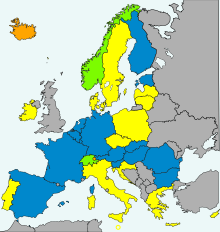Prüm Convention
| Convention on the stepping up of cross-border cooperation, particularly in combating terrorism, cross-border crime and illegal migration | |
|---|---|

Parties to the Prüm Convention and Prüm Decision participants
Other Prüm Decision participants
Other EU member states
non-EU member states which have signed an agreement to participate
|
|
| Type | Intergovernmental agreement |
| Signed | 27 May 2005 |
| Location | Prüm, Germany |
| Effective | 1 November 2006 |
| Condition | 2 ratifications |
| Parties | 14 |
| Depositary | Ministry of Foreign Affairs of the Federal Republic of Germany |
| Languages | German, Spanish, French and Dutch (original) |
|
|
|
The Prüm Convention (sometimes known as Schengen III Agreement) is a treaty which was signed on 27 May 2005 by Austria, Belgium, France, Germany, Luxembourg, the Netherlands and Spain in the town of Prüm in Germany, and which is open to all members of the European Union, 14 of which are currently parties.
The treaty was based on an initiative by the then German Minister Otto Schily from mid-2003. Core elements of the convention were picked up by EU Council Decision 2008/615/JHA on 23 June 2008 on the stepping up of cross-border cooperation, particularly in combating terrorism and cross-border crime.
The full name of the treaty is Convention between the Kingdom of Belgium, the Federal Republic of Germany, the Kingdom of Spain, the French Republic, the Grand Duchy of Luxembourg, the Kingdom of the Netherlands and the Republic of Austria on the stepping up of cross-border cooperation, particularly in combating terrorism, cross-border crime and illegal migration.
The Convention was adopted so as to enable the signatories to exchange data regarding DNA, fingerprints and vehicle registration of concerned persons and to cooperate against terrorism. It also contains provisions for the deployment of armed sky marshals on flights between signatory states, joint police patrols, entry of (armed) police forces into the territory of another state for the prevention of immediate danger (hot pursuit), and cooperation in case of mass events or disasters. Furthermore, a police officer responsible for an operation in a state may, in principle, decide to what degree the police forces of the other states that were taking part in the operation could use their weapons or exercise other powers.
...
Wikipedia
